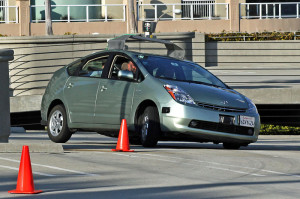 An autonomous car, developed by the auto supplier Delphi Automotive, has just started a 3,500-mile test drive across the U.S. Officials from the Michigan-based company believe the trip will be the longest automated drive ever attempted in North America.
An autonomous car, developed by the auto supplier Delphi Automotive, has just started a 3,500-mile test drive across the U.S. Officials from the Michigan-based company believe the trip will be the longest automated drive ever attempted in North America.
The Audi SQ5 began its journey only a day ago in San Francisco and it is planned to arrive at the New York Auto Show about a week later, on April 3. Although, at least two Delphi’s engineers will sit behind the wheel all the time, the car will rely mostly on its own systems. Driving the car for six to eight hours a day, while facing changing weather conditions, varied terrain and road hazards, will collect valuable data that can help improve the technology, as well as lower the cost.
Delphi already showed off the car at the Consumer Electronics Show in Las Vegas in January, where during a demonstration, the car had to avoid “drunk” pedestrians falling into the street in front of it and navigate through extremely congested traffic.
Delphi’s autonomous vehicle looks like an ordinary car and not, as the driverless cars developed by Google, Honda and the other companies, a science fiction project with spinning sensors on top, scanning the area with lasers. Instead, lidar laser mapping sensors are mounted into Delphi’s car front, rear and sides. The vehicle is equipped with car-to-car communication technology, cameras and radar sensors that can detect road obstacles.
The technology that interprets the data drawn from those systems and helps the car make driving decisions was developed jointly by Delphi and Ottomatika, an automated driving software startup out of Carnegie Mellon University. This is a project Delphi has been working on for more than a year, the company admits. Delphi has tested its technologies on other cars, such as Volvos, Fords and others.
The company says its autonomous test vehicle is far more advanced than anything on the road today. The car is capable of making complex decisions, like stopping and proceeding at a four-way stop, timing a merge onto the highway or calculating the safest maneuver around a bicyclist on a city street.
Delphi’s officials haven’t revealed how much their autonomous prototype costs. Obviously, this technology currently is rather expensive, as lidar systems cost upward of $60,000 each.
Jeff Owens, Delphi’s chief technology officer says that although much of the technology required for autonomous driving is in cars today, fully autonomous driving could come after 2020 and driverless cars are even further away.